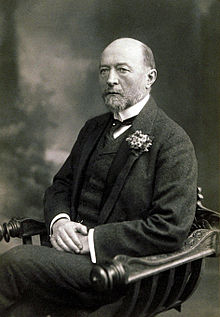Emil von Behring | |
|---|---|
 | |
| Born | Adolf Emil Behring 15 March 1854 |
| Died | 31 March 1917 (aged 63) |
| Nationality | German |
| Known for | Diphtheria antitoxin/serum |
| Awards | Cameron Prize for Therapeutics of the University of Edinburgh (1894) Nobel Prize in Physiology or Medicine (1901) |
| Scientific career | |
| Fields | Physiology, immunology, ophthalmology |
| Notable students | Hans Schlossberger |
Emil von Behring (German: [ˈeːmiːl fɔn ˈbeːʁɪŋ] ; Emil Adolf von Behring: born Emil Adolf Behring; 15 March 1854 – 31 March 1917), was a German physiologist who received the 1901 Nobel Prize in Physiology or Medicine, the first one awarded in that field, for his discovery of a diphtheria antitoxin. He was widely known as a "saviour of children", as diphtheria used to be a major cause of child death.[1] His work with the disease, as well as tetanus, has come to bring him most of his fame and acknowledgment.[2] He was honoured with Prussian nobility in 1901, henceforth being known by the surname "von Behring".
- ^ Emil von Behring on Nobelprize.org The Immune System: In Defence of our Lives, nobelprize.org
- ^ Bynum, W. F. (2007-04-01). "DEREK S. LINTON. Emil von Behring: Infectious Disease, Immunology, Serum Therapy. (Memoirs of the American Philosophical Society, number 255.) Philadelphia: American Philosophical Society. 2005. Pp. xi, 580. $65.00". The American Historical Review. 112 (2): 605–606. doi:10.1086/ahr.112.2.605. ISSN 0002-8762.